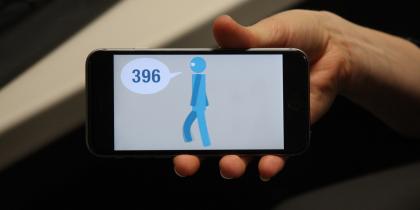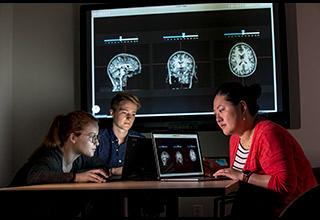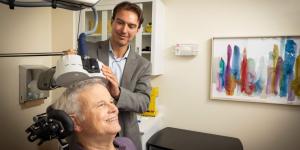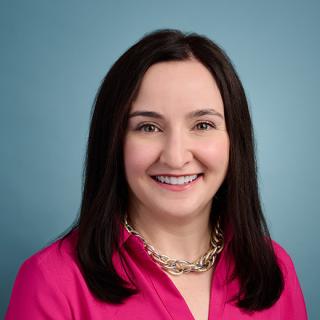Marcus Institute Researchers Take Part in the Football Players Health Study
New iPhone app tests mobility and balance in retired players and the general public

It’s said that with the rise of smartphones, we have the world at our fingertips. Now, thanks in part to researchers at the Hinda and Arthur Marcus Institute for Aging Research, that world includes medical research.
Marcus Institute scientists are part of a collaboration that has created a new iPhone app to test the health of retired NFL players. But you don’t have to be a football player to participate, or to benefit.
The TeamStudy iPhone app is part of the Football Players Health Study at Harvard University, a major undertaking funded by the National Football League Players Association (NFLPA). The goal of this study is to uncover the complex, long-term effects of a career in professional football.
The app remotely tests the user’s performance in a number of areas, including mental function, heart health, balance, and mobility. Dr. Brad Manor, Director of the Marcus Institute's Mobility and Brain Function Lab, collaborated with researchers from Beth Israel Deaconess Medical Center and Sage Bionetworks to build the part of the app that tests and quickly analyzes balance and mobility.
Dr. Manor’s area of study is the connection between mental function and mobility. “People often think of mental and physical health as separate, but in reality, they’re intertwined,” he says. “For example, research shows that with mental decline comes a reduction in the ability to dual task. In other words, older adults with even subtle mental deficits often have considerable difficulty walking and talking at the same time, or safely carrying groceries up a set of stairs.”
The portion of the app Dr. Manor’s team developed tests the user’s ability to dual task by having them stand and walk while simultaneously performing additional mental tasks, like counting backwards. The phone is placed in the pocket and its sensors track the person’s movements throughout the test.
Excitingly, members of the general public can download and use the app and eventually compare their results to retirees of the NFL. The Football Players Health Study has already recruited more than 3,100 former NFL players, ranging in age from mid twenties through their seventies. “It’s also an incredible new way to study the effects of aging,” says Dr. Manor.
The TeamStudy app represents a new way of conducting clinical research. In-person research studies, especially in older adults, can be resource intensive, requiring time and commitment for participants to travel to and from the research site, along with time and expense for staff to administer tests.
“This app is a quick and cost-effective way to acquire extremely valuable data,” explains Dr. Manor. “For example, we can administer tests once a week, instead of just a few times over the course of a clinical trial. And, we’ve validated the app data against gold-standard equipment to show that the results gathered by the phone are just as reliable as those gathered in our lab.”
In addition to the amount of data this gives researchers to pore over, the app is expected to have implications for an individual’s health. In the future, a user could bring the results of his balance tests to a primary care physician to show change over time, or see if her function has improved as a result of rehabilitation or pain management. The technology is also expected to be used for many other research studies in the years to come.
Says Dr. Manor, “What was originally developed for football players is now a valuable tool for ongoing aging research.”
Blog Topics
Learn More
Research on Aging
At the Hinda and Arthur Marcus Institute for Aging Research, Harvard Medical School-affiliated researchers are working to uncover answers to some of the most pressing challenges of aging.





